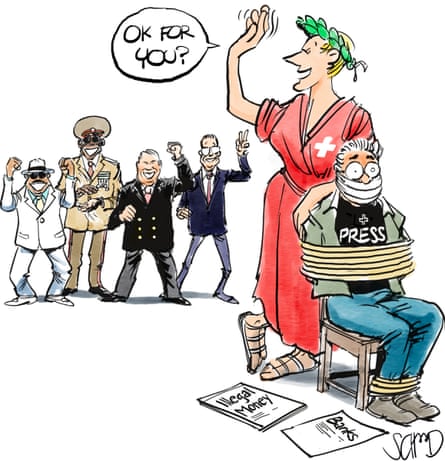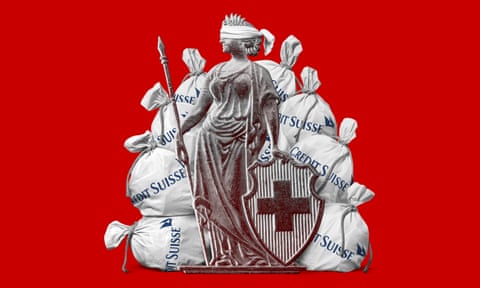In popular culture, there is nowhere safer to stash your cash than the vault of a Swiss bank. From thrillers to spy novels, Swiss bankers are depicted as discreet men in suits who know which questions not to ask. As James Bond quipped in The World Is Not Enough: “If you can’t trust a Swiss banker, what’s the world come to?”
Switzerland dismisses such stereotypes as lazy and outdated. But its reputation as one of the premier tax havens has not come out of nowhere. The country has nurtured, codified and even advertised the discretion of its bankers for centuries, enjoying lucrative returns as wealthy elites flocked to the Alps to stockpile their riches.
Over the past decade, however, things have started to change. When Switzerland began requiring its banks to share client data with some foreign authorities under a global exchange system to combat tax evasion in 2018, it was heralded as a watershed moment. Some even called it the end of Swiss banking secrecy.
Quick GuideSuisse secrets
Show
What is the Suisse secrets leak?
Suisse secrets is a global journalistic investigation into a leak of data from the Swiss bank Credit Suisse. It comprises more than 18,000 bank accounts that were leaked to Süddeutsche Zeitung by a whistleblower who said Swiss banking secrecy laws were "immoral". The data, which is only a partial capture of the bank’s 1.5 million private banking clients, is linked to more than 30,000 Credit Suisse clients. The leak includes personal, shared and corporate bank accounts – holding, on average, 7.5m Swiss francs (CHF). Almost 200 accounts in the data are worth more than 100m CHF, and more than a dozen are valued in the billions. While some accounts in the data were open as far back as the 1940s, more than two-thirds were opened since 2000. Many of those were still open well into the last decade, and a portion remain open today.
The Guardian was among more than 48 media partners around the world including journalists at Le Monde, NDR, the Miami Herald and the New York Times. They spent months using the data to investigate the bank, in a project coordinated by Süddeutsche Zeitung and the Organized Crime and Corruption Reporting Project (OCCRP). They unearthed evidence Credit Suisse accounts had been used by clients involved in torture, drug trafficking, money laundering, corruption and other serious crimes, suggesting widespread failures of due diligence by the bank. It is not illegal to have a Swiss account and the leak also contained data of legitimate clients who had done nothing wrong. In its response, Credit Suisse said it "strongly rejects the allegations and inferences about the bank’s purported business practices".
Our reporting suggests that conclusion was overblown. Swiss banks do share client data with many countries, but many developing nations are excluded from the global exchange system set up to combat tax evasion and fraud.
Meanwhile, Switzerland’s famed banking secrecy law – article 47 of the 1934 Federal Law on Banks – remains in force. Those who fall foul of it risk a five-year prison sentence.

Not that long ago Switzerland strengthened its banking secrecy law, which had originally applied only to bankers and other insiders. Since 2015, the law could theoretically be applied to any third party who “reveals” or “exploits” a secret that has come from within a Swiss bank.
The wording is sufficiently vague that an overzealous prosecutor might think about using it against a journalist exposing wrongdoing by a Swiss bank or its clients. Any such move would be considered a brazen attack on free expression, not least in a country such as Switzerland, which is among the top 10 countries in the World Press Freedom Index.
But it is not outside the realms of possibility. The UN special rapporteur on the promotion and protection of the right to freedom of opinion and expression, Irene Khan, told a reporter in the consortium of journalists investigating Credit Suisse that she was assessing article 47.
“I can say very clearly that international law gives journalists the right to publish information that is in the public interest, and financial or banking information can fall into that category, for instance if it concerns public personalities,” she said. “The right to privacy cannot be used as grounds to restrict the right of the media to publish information that may be of public interest.”

While far-fetched, the possibility that Switzerland’s prosecutors might use its banking secrecy statute to criminalise journalists led to the decision to protect Swiss media outlets from such a scenario by excluding them from the consortium investigating the leaked data.
There were more than 160 reporters from 48 media outlets involved in the Suisse secrets project – but none of them were in Switzerland. Perversely, Swiss citizens wanting to read how the country’s second-largest lender provided services to corrupt leaders and money launderers can do so only via the foreign press.
“This law is a massive restriction of press freedom in Switzerland,” said Arthur Rutishauser, the editor-in-chief of Tamedia, which would have been a logical Swiss partner in the project. “The law can protect criminals and their assets. Journalists who try to expose them risk criminal proceedings for doing so.”
For media outside of Switzerland, including the Guardian, the country’s radical banking secrecy law was also a consideration, albeit a less direct one. It was among many factors considered when we weighed the public interest case for reviewing the leaked data – and, more recently, decided to publish some of it.
Quick GuideSuisse secrets media partners
Show
Suisse secrets media partners
Media partners and journalists who participated in the Suisse secrets investigation, which was coordinated by Süddeutsche Zeitung and the OCCRP:
The Guardian: David Pegg, Kalyeena Makortoff, Martin Chulov, Paul Lewis, Luke Harding; Süddeutsche Zeitung: Ralf Wiegand, Jörg Schmitt, Bastian Obermayer, Frederik Obermaier, Hannes Munzinger, Mauritius Much, Emilia Garbsch, Nina Bovensiepen, Sophia Baumann; OCCRP: James G Wright, Erin Klazar, Juliet Atellah, Olgah Atellah, Kira Zalan, Mohamed Ebrahem, Amra Džonlić Zlatarević, Martin Young, Jonny Wrate, Julia Wallace, Sharad Vyas, Jurre van Bergen, Alina Tsogoeva, Beauregard Tromp, Jan Strozyk, Tom Stocks, Graham Stack, Karina Shedrofsky, Khadija Sharife, Sana Sbouai, Paul Radu, Miranda Patrucic, Stelios Orphanides, James O’Brien, Ahmad Noorani, Mark Nightingale, Will Neal, Eli Moskowitz, Ilya Lozovsky, Erin Klazar, Peter Jones, Mathias J, Maha All Rashid, Kevin Hall, Kai Evans, Eduardo Goulart, Misha Gagarin, Brian Fitzpatrick, Jared Ferrie, Alex Dziadosz, Stevan Dojčinović, Romina Colman, Umar Cheema, Lindita Cela, Birgit Brauer, Natalia Abril Bonilla, Eric Barrett, Antonio Baquero, Abdulwahed Al, Mark Anderson; Le Monde: Madjid Zerrouky, Faustine Vincent, Maxime Vaudano, Joan Tilouine, Thomas Saintourens, Anne Michel, Benjamin Barthe, Jérémie Baruch; NDR: Julia Wacket, Benedikt Strunz, Elena Kuch, Antonius Kempmann, Volkmar Kabisch, Johannes Jolmes, Lisa Maria Hagen, Lena Gürtler; New York Times: Ben Hubbard, David Enrich, Jesse Drucker; Miami Herald: Ben Wieder, Jay Weaver, Casey Frank, Antonio Delgado, Shirsho Dasgupta, Aaron Albright; CIN: Mirjana Popovic, Jelena Jevtić, Mubarek Asani, Aladin Abdagic; Trece Costa Rica Noticias: Mercedes Agüero R; Irpimedia: Lorenzo Bagnoli, Cecilia Anesi; Slidstvo_info: Yanina Korniienko, Anna Babinecs; Alqatiba: Walid Mejri, Rahma Behi; WDR: Massimo Bognanni; Investico: Karlijn Kuijpers, Romy van der Burgh; IRL: Bojan Stojanovski, Ivana Nasteska, Aleksandra Denkovska, Maja Jovanovska, David Ilieski, Saska Cvetkovska, Trifun Sitnikovski, Denica Chadikovska; Reporter.lu: Laurent Schmit, Luc Caregari; Le Soir: Joël Matriche, Xavier Counasse; SVT: Johan Wikén, Aris Velizelos, Joachim Dyfvermark; Twala.info: Lyas Hallas; The Confluence: Josy Joseph; Armando.info: Roberto Deniz, Patricia Marcano, Joseph Poliszuk, Ewald Scharfenberg, Valentina Lares; profil: Michael Nikbakhsh, Stefan Melichar; Interferencia de Radioemisoras UCR: Hulda Miranda; Diario Rombe: Delfín Mocache; La Stampa: Gianluca Paolucci; Expresso: Micael Pereira; Krik: Dragana Pećo. Infolibre: Manuel Rico; Infobae: Sandra Crucianelli, Mariel Fitz Patrick, Iván Ruiz; La Nación: Hugo Alconada Mon; Libya: Rami Salim; Efecto Cocuyo: Laura Weffer; Hetq: Samson Martirosyan, Edik Baghdasaryan; Prachatai: Yiamyut Sutthichaya, Rattanaporn Khamenkit; Africa Uncensored: John; Dépêches du Mali: David Dembele; Premium Times: Idris Akinbajo, Dapo Olorunyomi; Gambia: Marr Nyang; Verdade: Aderito Caldeira; The Namibian: Shinovene Immanuel; NewsHawks: Dumisani Muleya; L’Evenement: Moussa Aksar; Impact.sn: Momar Dieng.
There are legitimate reasons why some Credit Suisse clients might want an offshore account, and it is not illegal to have one – assuming it is declared to the tax authorities. The 30,000 Credit Suisse clients in the leaked data include customers who have done nothing wrong and have an entirely reasonable expectation of privacy in their financial affairs.
Their data was never of interest to investigative journalists focused on exposing wrongdoing and contributing to public debate about the banking system.
However, decades of scandals have made clear that Swiss banks generally – and Credit Suisse in particular – have attracted illicit funds from tax evaders, kleptocrats and money launderers. Financial crime is a serious issue of global public interest. When it involves corruption in the developing world, the impact on the world’s poorest can be profound.
When an anonymous source leaked the Credit Suisse data to Süddeutsche Zeitung, Germany’s largest broadsheet newspaper, they knew exactly what they were doing. This was not a dump of data on the darknet or a sale to the highest bidder.
The recipients of the leak – Frederik Obermaier and Bastian Obermayer – are the award-winning investigative reporters behind the massive offshore leaks that led to the Panama and Paradise papers. In leaking the data to them, the source appears to have made a moral choice to circumvent what they said were Switzerland’s “immoral” banking secrecy laws.
Months of painstaking reporting have unearthed evidence that Credit Suisse had clients involved in torture, drug trafficking, money laundering and corruption. Some were allowed to open bank accounts years after they had been convicted for serious financial crimes.
In other cases, the data raises questions about unexplained wealth, or whether Credit Suisse asked basic questions about the origin of a client’s funds.
Deciding to publish these stories has been a balancing exercise. On one side: personal issues of privacy, confidentiality and data protection, and a Swiss banking secrecy law that could be used to censor reporting. On the other: the public’s right to know about wrongdoing. And our duty to reveal it.
Credit Suisse response to Suisse secrets disclosures available here.
Support independent investigative Guardian journalism
Make a contribution from just £1
Become a digital subscriber and get something in return for your money
